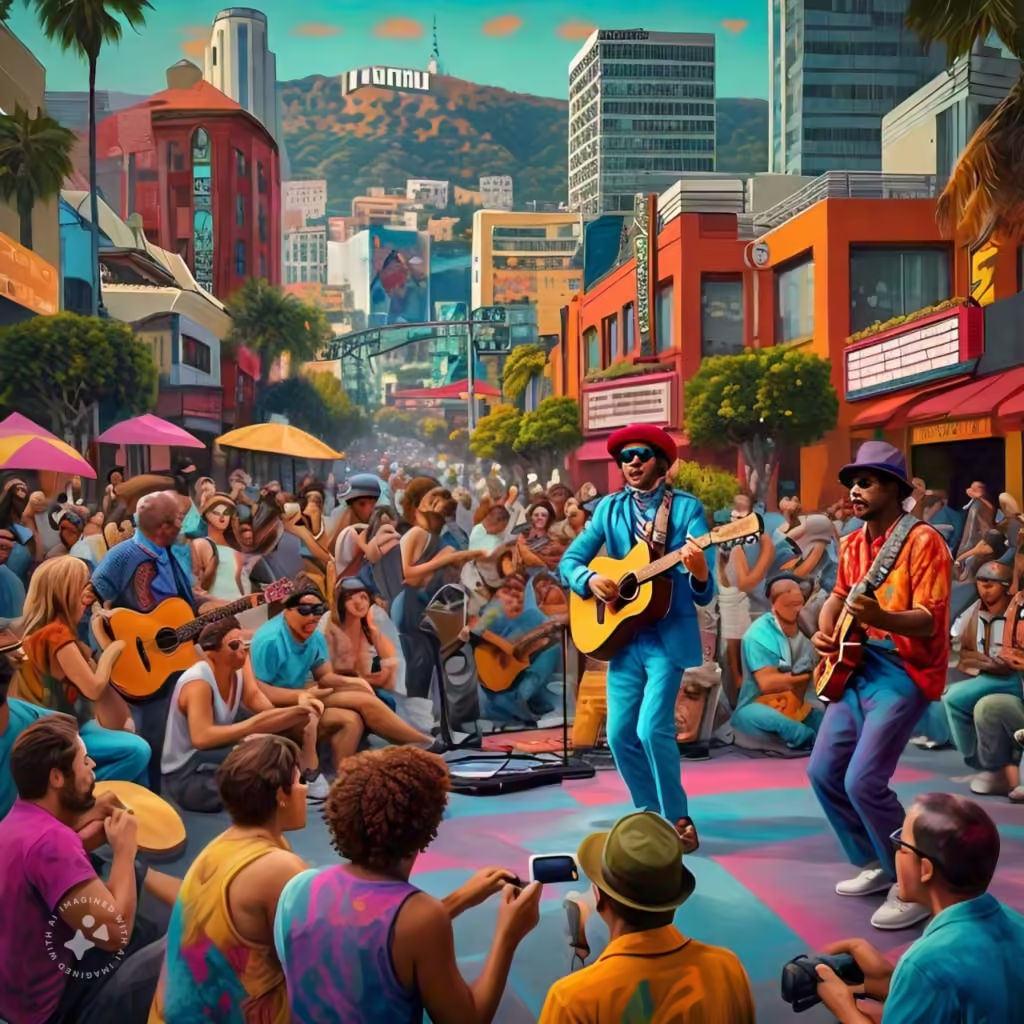Los Angeles, or LA, is one of the most famous cities in the world, known as the heart of the entertainment industry. Home to Hollywood, LA has played a huge role in shaping movies, television, music, and the arts for over a century. This city attracts creative talent from all over the world, and its history is full of fascinating stories about how it became the global center of entertainment. In addition to its role in media, LA is a cultural hub, offering diverse experiences in food, art, music, and fashion. Let’s explore how Los Angeles grew into this unique position and what makes it such a remarkable place today.
1. The Birth of Hollywood: How it All Began
Los Angeles wasn’t always a center of entertainment. In the early 1900s, the film industry was based on the East Coast, especially around New York City. However, several factors drove film producers to move west to California. First, the weather in LA was perfect for filming because it was sunny most of the year, and rain was rare. This allowed filmmakers to shoot movies outdoors in natural light almost any day they wanted.
Second, Los Angeles offered a diverse range of landscapes and settings. Within a short drive, filmmakers could find beaches, deserts, mountains, forests, and even urban settings. This variety allowed them to film scenes set in different environments without having to travel far, saving time and money.
Additionally, moving to California helped filmmakers escape from strict patent regulations that were enforced on the East Coast. Thomas Edison and his company held many patents on film technology, and they were strict about enforcing their rights. LA, being far from Edison’s control, allowed filmmakers to work more freely.
2. The Golden Age of Hollywood
By the 1920s and 1930s, Hollywood was booming, and Los Angeles became the headquarters of the world’s film industry. Major studios like MGM, Warner Bros., Paramount, and Universal built massive studios in LA, where they produced countless films. This period, often called the “Golden Age of Hollywood,” was when many classic movies were made, and movie stars like Charlie Chaplin, Marilyn Monroe, and Humphrey Bogart became global icons.
The Golden Age also marked the rise of “movie palaces,” beautiful, luxurious theaters where people could watch films. These theaters helped make moviegoing a popular cultural activity, attracting audiences from all walks of life. People around the world were fascinated by Hollywood, and LA became synonymous with the magic of the movies.
3. Television and the Expansion of Entertainment
In the 1950s, television became a new force in entertainment, and Los Angeles quickly adapted to this change. Television studios and networks set up in LA to produce a wide range of shows, from comedies and dramas to game shows and news programs. The success of TV helped solidify LA’s role as a leading entertainment center, with stars, writers, directors, and technicians all finding work in the growing industry.
With both movies and television booming, LA became a place where creative professionals could thrive. The industry attracted not only actors and filmmakers but also musicians, artists, writers, and fashion designers. Over time, this led to a creative environment where people from different backgrounds and disciplines came together, making Los Angeles a unique and vibrant cultural hub.
4. The Influence of Music and Art in LA
As the entertainment industry grew, Los Angeles also became known for its music scene. By the 1960s and 1970s, LA was a major center for rock music, with legendary bands like The Doors, The Eagles, and The Beach Boys all getting their start there. The city’s music industry kept evolving, and in the 1980s and 1990s, it became a hub for hip-hop, with artists like Dr. Dre, Tupac, and Snoop Dogg rising to fame. Today, LA continues to be influential in music, covering genres from pop to alternative to hip-hop, attracting musicians and fans from all over.
LA is also known for its thriving art scene. The city is home to world-class museums like the Los Angeles County Museum of Art (LACMA) and The Getty Center, which attract millions of visitors. But beyond museums, LA has a vibrant street art culture, especially in neighborhoods like Downtown LA and Venice Beach, where murals and graffiti are celebrated as an art form. This creative atmosphere has helped make Los Angeles a magnet for artists and art lovers alike.
5. Los Angeles as a Cultural Melting Pot
One of the unique aspects of Los Angeles is its diversity. People from all over the world have come to LA, bringing with them their traditions, languages, foods, and art. As a result, Los Angeles is a true melting pot, with neighborhoods like Koreatown, Little Tokyo, Chinatown, and Olvera Street representing different cultural heritages. This diversity has enriched the city’s food scene, with cuisines from every corner of the world available in LA, from Mexican and Korean to Ethiopian and Persian.
The diversity of Los Angeles extends beyond food. The city hosts numerous cultural festivals, parades, and events celebrating its many communities. From the Chinese New Year Festival in Chinatown to the Day of the Dead celebrations in East LA, these events showcase the rich cultural heritage of Los Angeles and help bring people together.
6. How LA Embraced Innovation and Technology
Another reason Los Angeles became the center of the entertainment industry is its willingness to embrace innovation and technology. As film and television technology evolved, LA stayed at the forefront of new techniques, from sound recording to special effects. In recent decades, the rise of digital media has transformed entertainment once again, and LA has adapted to this change as well.
Today, the city is home to tech companies and digital media startups that are pioneering new ways to create and share content. With the growth of streaming platforms like Netflix, Hulu, and Disney+, many of which are headquartered in LA, the city continues to lead the way in how entertainment is produced and consumed.
7. Tourism and Iconic Landmarks
Millions of people visit Los Angeles each year, drawn by the allure of Hollywood and the chance to see famous sights. Some of LA’s most iconic landmarks include the Hollywood Walk of Fame, where stars honor famous actors, musicians, and filmmakers; the TCL Chinese Theatre, where many famous movies have premiered; and the Hollywood Sign, which has become a symbol of the city.
Other famous places include the Santa Monica Pier, Venice Beach, Griffith Observatory, and the Getty Center. These landmarks give visitors a taste of the city’s rich history and its connection to the world of entertainment. The tourism industry plays a big role in LA’s economy, and the city’s reputation as a glamorous entertainment capital attracts people from all over the world.
8. Why Los Angeles Stands Out as a Global Cultural Hub
What makes Los Angeles truly unique is its combination of entertainment, creativity, diversity, and innovation. No other city blends these elements in quite the same way. As a global cultural hub, LA isn’t just about movies or music—it’s a place where ideas come to life, where different cultures meet, and where creativity is constantly evolving.
LA’s creative energy is contagious, drawing in artists, entrepreneurs, and dreamers who come to pursue their passions. The city offers opportunities for collaboration across fields, allowing artists to work with filmmakers, musicians to collaborate with visual artists, and writers to connect with designers. This collaborative atmosphere is rare, and it’s one of the reasons Los Angeles remains a unique place in the world of culture and entertainment.
9. The Future of Los Angeles as an Entertainment and Cultural Capital
Looking to the future, Los Angeles is likely to remain a leader in entertainment and culture. With new technology, streaming services, and virtual reality, the ways we experience entertainment are constantly changing. Los Angeles has adapted to these changes before and is expected to continue evolving. The city’s commitment to innovation means it will likely play a big role in whatever the future of entertainment looks like.
As people continue to come to LA from around the world, bringing their cultures, ideas, and creativity, the city’s cultural diversity will keep growing. This diversity strengthens LA’s role as a global cultural hub, a place where anyone can feel at home and where all voices can be heard.
Conclusion
Los Angeles has become the center of the entertainment industry and a global cultural hub through a combination of historical, geographical, and cultural factors. Its sunny weather, diverse landscapes, and innovative spirit drew early filmmakers, and over time, LA grew into a city filled with creativity, opportunity, and diversity. The city’s history in film, television, music, and art has helped shape global culture and continues to do so. With its unique blend of tradition and innovation, Los Angeles stands out as a city that represents dreams, creativity, and the power of cultural exchange.




